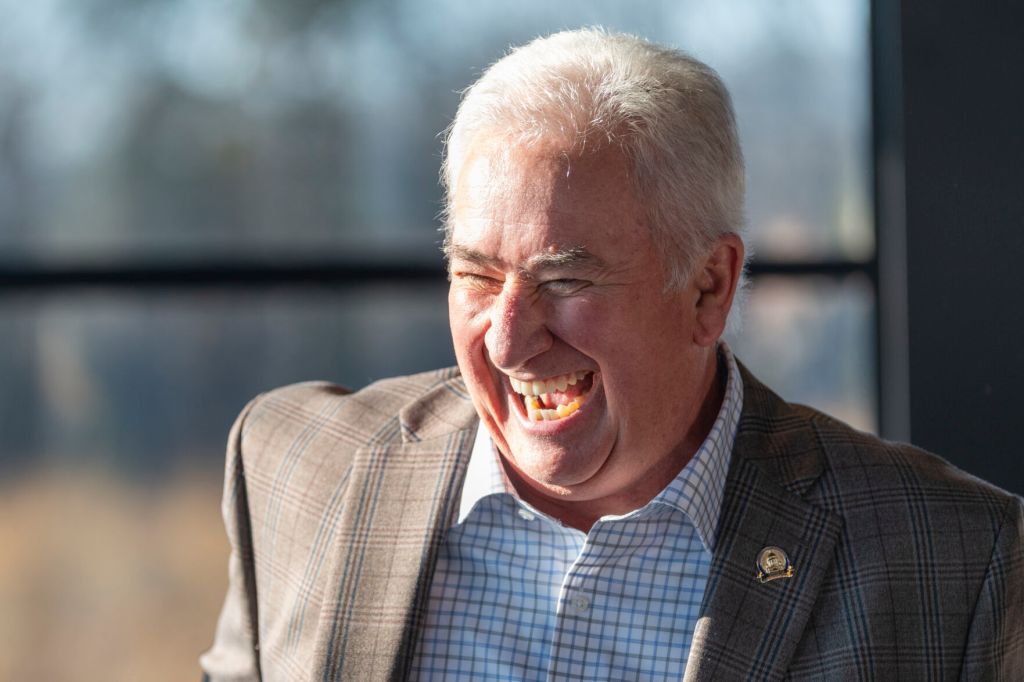Republican legislators discuss priorities over coffee
Published 8:00 am Thursday, December 28, 2023

- State Rep. Kevin Jackson, R-Bowling Green, discussed the Safer Kentucky Act and changes to Kentucky’s lifeguard regulations on Wednesday.
Republican leaders both local and statewide came together at Q Coffee Emporium on Tuesday for “Coffee and Conversation” to discuss legislative priorities in the upcoming session.
Senate Majority Whip Mike Wilson, R-Bowling Green, and State Reps. Michael Meredith, R-Oakland, Kevin Jackson, R-Bowling Green, and Robert Duvall, R-Bowling Green, laid out plans to address the opioid crisis, cut the Kentucky Department of Education’s budget and prevent suicide among veterans, to name a few.
Sen. Mike Wilson
Wilson explained that around 90% of Kentucky’s budget goes toward Medicaid, incarceration and education.
“Over 50% of our budget goes to education – K through 12 and post-secondary education,” Wilson said. “It’s about $15 billion per year and it will be a biennial budget, so that’s $30 billion.”
He plans to introduce legislation that would cut the state’s Department of Education budget.
“The Kentucky Department of Education gets about $500 million. They employ about 1,000 folks. I don’t think we need that many,” Wilson said. “So I’m working on that on the budget side to force them to downsize.”
Wilson told the Daily News that the department has acted like an “overlord” based on conversations he has had with some superintendents.
“(The department is) trying to control everything and make sure that everybody is in compliance with everything rather than being a support situation where they’re trying to support their districts and help,” Wilson said. “It’s very hard when you have people that have no experience in the area talking to the districts, and a lot of them are still working from home.”
He added that he plans to introduce changes to the statewide Board of Education that would require members to be elected rather than appointed by the governor, similar to how local boards operate.
Wilson also wants to push back on Diversity, Equality and Inclusion measures across the state with a bill that he compared to another in Tennessee. Tennessee’s Senate Bill 817, which passed in April, allows higher education entities to deny certain “divisive concepts” without repercussions.
The Tennessee bill outlines 16 concepts that include the idea that “an individual, by virtue of the individual’s race or sex, is inherently privileged, racist, sexist or oppressive, whether consciously or subconsciously” and “the rule of law does not exist, but instead is a series of power relationships and struggles among racial or other groups.”
Wilson said many DEI measures “elevate one race above another as an oppressive race” and go against their original intentions.
“We’re not banning DEI offices or anything in higher education. We’re just saying any of these divisive concepts cannot be utilized,” Wilson said.
Rep. Michael Meredith
Meredith said the multi-year effort to lower income taxes, aimed at removing it entirely, will be one of his top priorities.
“We’ve put ourselves on a path of getting to zero income tax two or three years ago,” Meredith said. “We have hit two of those targets. We initially lowered the overall rate from six to five, and on Jan. 1 of next year, our state income tax will go down to 4%.”
He said legislators missed the July target to lower the tax again in 2025 but they hope to continue the trend in 2026.
Meredith also said a Veteran Suicide Prevention bill will be another priority in the next session.
“We’re losing about 100 veterans a year in Kentucky to suicide, and that’s really unacceptable,” Meredith said. “(We’re) working with local veterans groups and state veterans groups on that legislation to hopefully have it finished up this week and file the first day of session.”
Meredith will also focus on updating much of Kentucky’s dated banking statutes to modernize regulations and protections.
“We have a banking statute code that was written mostly in the 1960s, and this place has changed a lot since the 1960s,” Meredith said. “We’ve only really updated it in the ’90s, so we’re 30 years outside of even the most recent major changes to the banking laws in Kentucky.”
Part of this includes preventing businesses from using the term “bank” to refer to themselves if they are not registered banks.
Rep. Kevin Jackson
Jackson said he hopes to “bring a little common sense to Frankfort” through his legislative priorities. Part of that, he said, includes working directly with constituents to determine what needs to be done.
He said he’s discussed transportation issues with Judge-Executive Doug Gorman and Mayor Todd Alcott and “trusts their judgment” on project suggestions.
“It was a great opportunity to find out where they see the growing areas in Bowling Green and Warren County,” Jackson said. “I had a chance to take two of those projects back to Frankfort, so I gave each one of them an opportunity.”
Gorman, who was in attendance, said expanding infrastructure is a constant need within both the county and the city.
“We want to have better access to I-65, so we’ve got a couple of projects that we’re looking to ramp up,” Gorman said.
He also noted that the work-in-progress Buc-ees at 4001 Smiths Grove-Scottsville Road, which broke ground in June, will “change the demands and things in the northern part of the county.”
“We want to invest a little bit in Oakland and the northern interchange up there up to I-65, different things like that we’re looking at,” Gorman said. “Our biggest thing is we have to continually communicate (that) here’s where the growth is, here’s how we can get people safely back and forth to work and home.”
Jackson said he’ll also be pushing the Safer Kentucky Act, an 18-point plan formed by a group of Louisville lawmakers that seeks to address violent crime in Kentucky.
Among the proposed points are expanded penalties for fentanyl dealers, a “three-strikes” law for repeat felony offenders and allowing the death penalty for an individual charged with the death of a first responder.
“We know Jefferson County has a lot of crime, but as we continue to grow, we’re going to have crime too,” Jackson said.
Jackson also plans to introduce the Lifeguard Act to relax lifeguard requirements for certain private groups, which he called “government overreach” by the Cabinet of Health and Family Services.
He said he has had discussions with swimmers and coaches across Bowling Green who are concerned that the regulations will severely restrict the operations of school swim teams and community competitive leagues.
He said Bowling Green High School’s team, for example, will need to have at least one lifeguard posted for every practice despite having several lifeguard-certified coaches attending each session.
“It doesn’t sound like anything big maybe to some of us, but to those people who participate in that, it is something important,” Jackson said.
Rep. Robert Duvall
Duvall’s sights are set largely on issues facing Kentucky’s health care system and the health of residents. He said his 28 years as an optometrist have given him firsthand knowledge of the issues both patients and providers face.
He hopes to lower the wait time for patients seeking prior authorization, wherein a provider must get approval from a health plan before administering a service or medication.
“We’ve all experienced this. You go to the doctor, your provider prescribes something or recommends a procedure, and then that prior authorization process starts and it can take days, it can take weeks to get that medication or that procedure done,” Duvall said.
Duvall said he’s working with other legislators to streamline the process and allow Kentuckians access to medical services faster.
He said he will also prioritize solutions to the opioid crisis that has plagued Kentucky for years.
“(Bowling Green/Warren County Drug Task Force Director) Tommy Loving is doing a great job of leading those efforts here, as well as our sheriff and our local law enforcement,” Duvall said. “But as we legislators shared, we’re here for you, we’re going to pass whatever legislation we can to clean up the drug problem.”
Duvall told the Daily News that while opioid addiction and deaths are most prominent in eastern Kentucky, the issue is “all around us,” even locally. He pointed to declining mental health among many Kentuckians as a cause that was exacerbated by the COVID-19 pandemic.
“Mental health issues lead to drug addiction, and you could also make the argument that the reverse is also true,” Duvall said. “I believe that as a state, we have to do a better job of dealing with mental health.”
Duvall said he and others are exploring regional centers that focus on mental health treatment and provide faster access to services for patients in need.
“They (would) have quick access to mental health treatments, and if we can get control of our mental health issue, that’s going to take care of a lot of other problems in our state,” Duvall said.
He added that the plan would likely seek funding from the Kentucky Opioid Abatement Advisory Commission, which received settlements from opioid manufacturers and distributors charged with contributing to addiction and overdose rates.
“I don’t care who you are, what side of the bench you’re on, I believe we all agree that we need to help people and we need to help people deal with their mental issues,” Duvall said.
Legislators will return to session on Jan. 2.






